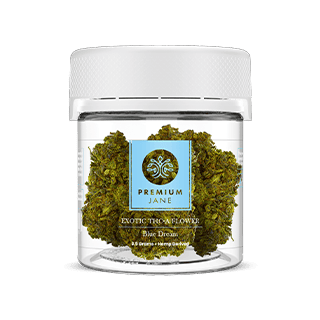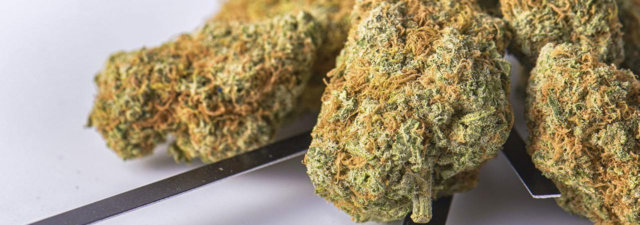With cannabis use becoming more commonplace, some health-conscious consumers have begun wondering how it may affect cholesterol levels.
As is often the case, there exists sparse clinical research on the subject. However, early studies show that cannabinoids, especially CBD, can indeed impact cholesterol in some circumstances.
So, does cannabis affect cholesterol for better or worse? We explain all you need to know in this in-depth article. But first, let’s look at what cholesterol is and how it influences our health.

Want to experience the qualities of THC-A flower? The amazing brand Premium Jane just launched their new line, including strains like OG Kush, Purple Cream, and Blue Dream Pie. Averaging 23% THC-A, there’s so much to love with these flowers. Try them today to get 20% off using WayofLeaf’s exclusive coupon code: THCAWOL
What Is Cholesterol?
Cholesterol is a lipoprotein, meaning it consists of both fat and protein molecules. It is a waxy substance and a key component of cell membranes. It has several crucial functions in the body, including acting as a precursor to sex hormones and vitamin D production.
Cholesterol is a lipoprotein that serves several critical functions in the body – including acting as a precursor to sex hormone and Vitmain D production.
The liver and intestines are major contributors to the endogenous production of cholesterol within the body. However, many foods also contain cholesterol, including meat, eggs, and dairy products. For this reason, people who eat these foods regularly may end up with high cholesterol – a significant risk factor for heart disease.
Cholesterol and Heart Health
Although some cholesterol is essential for good health, too much can be detrimental to an individual’s health. This is because excess cholesterol can combine with other substances and build up in the blood vessels.
These fatty build-ups are known as plaques, which can contribute to atherosclerosis, a narrowing, and hardening of the arteries.
Atherosclerosis causes inflammation in the blood vessels and can lead to coronary artery disease. Furthermore, if a plaque ruptures, blood clots can form and block the coronary artery. This prevents the heart from getting sufficient oxygen and can cause angina and heart attacks.
Atherosclerosis is also associated with other types of cardiovascular disease, including carotid artery disease, peripheral arterial disease, and strokes.
However, not all cholesterol is harmful. There are several different types, including:
- >Low-density lipoprotein (LDL): LDL is sometimes known as ‘bad cholesterol.’ It is the type of cholesterol that can form plaques and raise the risk of heart disease.
- Very low-density lipoprotein (VLDL): Like LDL, high levels of VLDL cholesterol have been associated with the development of plaque deposits on artery walls. However, VLDL is released into the bloodstream to supply body tissues with triglycerides. Triglycerides are another type of fat that could raise the risk of heart disease.
- High-density lipoprotein (HDL): Sometimes known as ‘good cholesterol,’ HDL transports LDL from the arteries to the liver for elimination.
What Is the Normal Cholesterol Level?
Target cholesterol levels vary depending on a person’s age and gender. The table below is a general guide:
Type of Cholesterol | Anyone Under 19 | Males Age 20+ | Females Age 20+ |
|---|---|---|---|
Total Cholesterol | Under 170mg/dL | 125–200mg/dL | 125–200mg/dL |
Non-HDL (including LDL, VLDL) | Under 120mg/dL | Under 130mg/dL | Under 130mg/dL |
LDL | Under 100mg/dL | Under 100mg/dL | Under 100mg/dL |
HDL | Over 45mg/dL | Over 40mg/dL | Over 50mg/dL |
How to Lower Cholesterol
Some people have naturally higher cholesterol levels than others. Age, ethnicity, and genetics all play a role. However, many of the factors that influence cholesterol levels relate to lifestyle, and, therefore, individuals can alter them.
Some of the best ways to lower cholesterol include:
- Eating a healthy diet (minimal meat, dairy, chocolate, baked goods, fried, and processed foods)
- Engaging in regular physical exercise to maintain a healthy body weight and increase HDL
- Not smoking (smoking raises LDL levels and decreases HDL)
If an individual cannot control their cholesterol by making these lifestyle adjustments, their doctor may prescribe a cholesterol-lowering medication. Some of the most common cholesterol drugs are called ‘statins’, including:
- Simvastatin
- Atorvastatin
- Pravastatin
- Rosuvastatin
Although these medications have demonstrated their efficacy in robust clinical trials, unpleasant side effects can still occur. Therefore, some people are looking for more natural alternatives and may be wondering whether cannabis or CBD could help.
So, how does cannabis affect cholesterol? Let’s take a look.
How Does Cannabis Affect Your Cholesterol?
There is currently little research on cannabis and cholesterol. However, there are a handful of studies that suggest it may have some effect.
A 2013 study for the Diabetes Care journal compared 30 cannabis smokers’ cholesterol levels with 30 control subjects. Cannabis use ranged from 3–30 joints per day (median 6) over 2–38 years (median 9.5).

The researchers found the cannabis smokers had lower HDL levels than the control subjects. However, there were no significant differences in total cholesterol, LDL, triglycerides, or free fatty acids. It is unclear whether the decrease in HDL levels was due to cannabis itself or the consumption method of smoking.
Furthermore, these results differ from those of a 2020 study that looked at CBD-containing hemp oil that illustrated significant improvements in HDL level among participants.
More Research on Cannabinoids and Cholesterol
A 2018 review for the Journal of the American Heart Association investigated the role of cannabinoids in cardiovascular disease. The paper primarily focused on delta-9 tetrahydrocannabinol (THC), the compound responsible for producing the typical cannabis high.
The authors found conflicting evidence regarding whether THC promotes or inhibits atherosclerosis.
It appears that by stimulating CB1 receptors in the endocannabinoid system, THC could increase oxidative stress and induce plaque formation. However, by stimulating CB2 receptors, it could reduce inflammation and inhibit LDL activity.
The review also mentions the CARDIA study, a project that followed cannabis users and non-users over 25 years. It found that cannabis users only had an increased risk of atherosclerosis if they smoked tobacco as well. The remaining studies in the review had inconclusive results, demonstrating the complex nature of cannabis chemistry.
Far more research is necessary before we fully understand the complex relationship between cannabis and cholesterol. However, more clear-cut evidence is emerging regarding the non-intoxicating cannabinoid cannabidiol (CBD).
CBD and Cholesterol
Recent research into CBD may help us to understand how cannabis affects cholesterol.
A 2011 study for Cellular and Molecular Neurobiology found that the compound influences cholesterol homeostasis, the process by which cells regulate cholesterol levels. This study illustrates how the endocannabinoid may play a role in cholesterol homeostasis.
A 2017 review for Cannabis and Cannabinoid Research investigated further. It found that CBD increased cholesterol levels in wild-type mice. However, it did not impact transgenic mice that already had high cholesterol. It also found that CBD increased HDL by 55% in obese mice while reducing total cholesterol by 25%.
Therefore, it appears that CBD has the potential to regulate cholesterol levels in the body. However, these are the results of laboratory studies, and it is impossible to say how they translate to humans.
Is It Safe to Take CBD Oil with High Cholesterol?
CBD is non-intoxicating, and most experts consider it to have a good safety profile. Therefore, it should be safe for people with high cholesterol to try.
However, there is a possible complication involving the use of CBD and cholesterol medication. CBD inhibits the activity of several liver enzymes. They include those responsible for metabolizing the cholesterol drugs simvastatin and atorvastatin.
Therefore, taking CBD oil with cholesterol medication could potentially produce adverse effects. Anyone considering doing so should consult a physician for further advice.
Does Cannabis Affect Your Cholesterol? Final Thoughts
There is insufficient evidence to conclusively say whether cannabis is good or bad for cholesterol.
While it appears that CBD could have a regulatory effect on cholesterol levels, human studies are currently lacking. And when it comes to THC, matters are even less clear-cut.
Some research studies suggest cannabis could raise the risk of atherosclerosis, while others state the opposite.
What we do know, though, is that smoking is a major risk factor for atherosclerosis. Therefore, it is advisable to avoid this consumption method, especially with tobacco.
Anyone worried about how cannabis use may be affecting their cholesterol levels should discuss their concerns with a knowledgeable physician.

Want to experience the qualities of THC-A flower? The amazing brand Premium Jane just launched their new line, including strains like OG Kush, Purple Cream, and Blue Dream Pie. Averaging 23% THC-A, there’s so much to love with these flowers. Try them today to get 20% off using WayofLeaf’s exclusive coupon code: THCAWOL




![4 Best Cannabis Strains That’ll Melt Away Anxiety [Updated]](https://wayofleaf.com/wp-content/uploads/2019/06/wol-banner-4-strains-thatll-melt-away-your-anxiety-640x225.jpg)


![5 Best Cannabis Strains to Help Combat Nausea [Definitive Guide]](https://wayofleaf.com/wp-content/uploads/2019/02/wol_best-marijuana-strains-nausea-640x225.jpg)




![Marijuana for Athletes [How It Does the Body Good]](https://wayofleaf.com/wp-content/uploads/2018/01/wol_cannabis-for-athletes.jpg)
